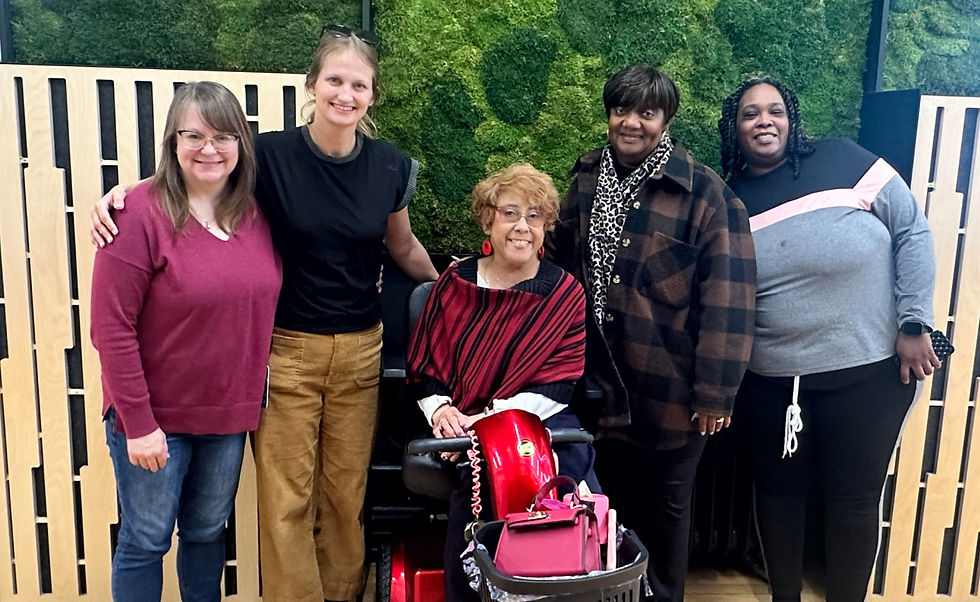The Gift of RESILIENCE, written by Sandy Heather
- MOMentum
- Jun 28, 2024
- 4 min read
Julie Libisi is a whirlwind of passionate energy and ideas. Brown curls vibrating with intensity, she leans forward in her chair, talking fast as she expresses her awe at the resilience of single moms. Raised by a single mother herself, Julie now raises a 13-year-old daughter on her own and knows all about the strength and skill it takes to be a solo parent in today’s ever-challenging world.
In addition to her work as a Project Director at College of Saint Mary while pursuing a PhD at UNMC’s College of Public Health, her experience also includes providing direct client services and program management in child welfare, HIV/AIDS, gender-based resilience, and refugee resettlement. Still, she manages to carve out time to support MOMentum as secretary of the growing nonprofit’s five-member Board of Directors.
Whew! That’s a lot. But it is a perfect fit for this strong woman who, like many of the single women MOMentum serves, has experienced the frustrating shame/blame game of the welfare system, survived leaving an abusive partner, and endured the constant pressure to be “all things at all times” at work and at home.
Still, Julie is undeterred in her efforts to change the way single moms are perceived. “In the U.S., especially, the philosophy is very individualistic. It’s the old ‘pull yourself up by your bootstraps’ attitude. But we are ALL needing more connection,” she observes.
And she’s not referring to the bright, happy photos posted on social media that often leave us feeling deficient. “We all have a lot more moments that aren’t photo ops. Still, you do what it takes when you’re sick and the kids are sick. It’s almost ironic how much we are expected to do it all but can’t do it all.”
With the help of organizations like MOMentum, Julie thinks we can do much better. “Mothers are incredibly resourceful and make things happen,” she says. “What if we helped our neighbors with their bootstraps? What if we developed programs and policies that allow us to do things together?”
There are pockets of that sense of community, she notes, but overall, that’s not the case. In particular, she cites the “very dehumanizing” welfare-to-work model with a frazzled caseworker expected to help clients get back on their feet. “As a society we say, ‘we’re going to give you what we think you need.’ It’s a very paternalistic approach to helping. Not realizing that the single mom has so many gifts, so many strengths, and really, the social worker probably needs help, too, and is just pretending not to while they go to work that day.”
And then there is the undeniable impact of trauma—an important issue for all moms, but especially for those who have survived violence, as Julie herself has. “The survivor has far more skills than the circumstance they came from,” Julie says firmly, adding that we simply don’t talk about trauma enough. “In all the services we provide to help women get out of poverty—whether it be from the government or nonprofits—we don’t talk about the trauma that you experienced before, or the trauma of poverty itself.”
Julie expresses frustration that our society focuses on the deficiencies and weaknesses of single moms in poverty but prefers we would amplify their innate protective factors and strengths. That’s where MOMentum comes in. By establishing a community of strong women who collectively want more for themselves and their families, MOMentum is helping to provide the basics women need to get out of poverty—rides to work, assistance with job preparation and career opportunities.
She says MOMentum is doing a great job, but laments the need for effective, multi-faceted policies to address key issues, like more flexibility with Medicaid, Welfare, Temporary Assistance for Needy Families (TANF), and Supplemental Nutrition Assistance Program (SNAP).
Whether it’s research, programs, policies, or services, Julie thinks moms need to add their voices to the discussion, and they need to be compensated for their input. “For the longest time, we’ve been acting like we know more than the clients that we’re trying to help. But no, as a society we don’t know more.”
She believes MOMentum is doing the critical listening and providing invaluable, trauma informed services. “We’re not just giving moms a bus pass. We’re picking them up at their door and driving them directly to where they need to go. Maybe it’s just too much to walk to the bus that day due to physical, mental, and emotional barriers.”
And long-term? Long term Julie hopes to realize MOMentum Founder and President Meredith Metcalf’s vision of providing childcare using a co-op model. “We’re in a childcare crisis, and a communal, collaborative, interdependent approach to childcare is exactly what we’re talking about,” she says. Instead of the top-down approach where a mother receives a Title 20 voucher and must go out and seek out a provider who will accept vouchers, Julie hopes MOMentum may someday facilitate a co-op where there are moms who need support, and they then leverage their gifts by providing quality childcare and, at the same time, helping other moms.
“That democratizes nonprofit work rather than this paternalistic, top-down approach to social services. Looking back at history, all huge movements have been about people helping people. That’s what MOMentum is all about.”



Comments